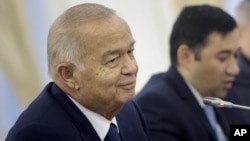Uzbekistan on Thursday freed one of its longest-serving political prisoners, a local human rights group said, shortly after U.S. Secretary of State John Kerry visited the country.
Murod Juraev, 63, an ex-parliamentarian and a member of the banned Erk (Freedom) party, was jailed for 12 years in 1994 for "attempting to overthrow the constitutional order." While he was in prison, his term was extended four times for alleged violation of prison rules.
"Murod Juraev was released today from a prison in the town of Chirchik near Tashkent. He is in high spirits after spending 21 years in jail," Vasila Inoyatova, who heads the Ezgulik (Kindness) rights group, told Reuters.
Washington welcomed Juraev's release and urged the Uzbek government to make it "a prelude to the release of other long-held journalists, activists and religious prisoners of conscience," a State Department spokesman said in a statement.
Ezgulik had several times urged Uzbek authorities to release
Juraev because his health was deteriorating.
Uzbekistan's prisons service declined to say whether Juraev had been freed, saying such information was confidential. The Foreign Ministry could not be reached for comment.
Inoyatova said international attention and voices from the European Union and the United States had helped to secure Juraev's release.
Trying to pursue a policy less dependent on its former imperial master, Russia, Uzbekistan is attempting to improve ties with the West, which has criticized its poor track record on human rights while valuing it as a bulwark against Islamist militancy spilling over from Afghanistan.
Kerry held talks with the strongman president, Islam Karimov, this month as part of a tour of ex-Soviet Central Asia intended to affirm Washington's engagement in the strategically important region.
Senator Ben Cardin, a Maryland Democrat who sits on the Senate Foreign Relations Committee, had written to Kerry expressing "concern about the erosion of the democratic process and respect for human rights across Central Asia" and asking him to raise the issue of political prisoners, including Juraev.
The government responds to international criticism by saying it is under pressure to withstand religious extremism.





